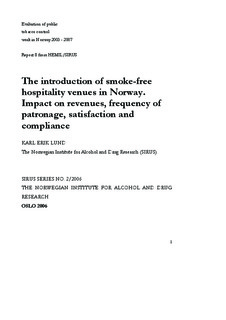The introduction of smoke-free hospitality venues in Norway. Impact on revenues, frequency of patronage, satisfaction and compliance. Evaluation of public tobacco control work in Norway 2003 - 2007 Report 8 from HEMIL/SIRUS
Research report
Permanent lenke
http://hdl.handle.net/11250/275947Utgivelsesdato
2006Metadata
Vis full innførselSamlinger
Originalversjon
SIRUS skrifter. 110 p. SIRUS, 2006Sammendrag
1.1 BackgroundAfter 16 years of exceptions from §6 of the Act relating to prevention of the harmfuleffects of tobacco, the so-called Tobacco Act, a smoke-free regime was introduced atall hospitality venues from 1 June 2004. The previous regulations regarding smoke-free areas in bars, pubs, cafés and restaurants were thereby superseded by an absoluteban on smoking indoors. The authorities' most important reason for revoking theexception was to afford employees in the hospitality industry the same protectionagainst passive smoking as other employees had had since §6 of the Tobacco Actcame into effect in 1988. Further, it is pointed out that hospitality venues,discotheques and the like were an important recruitment arena for smoking amongyoung people. Importance was also attached to the fact that numerous individualswith asthma and allergies could not patronise hospitality venues due to the problemsthey suffered as a result of smoke-filled indoor air. Finally, it was pointed out that theregulations on smoke-free areas were difficult for the industry in terms ofcompliance.The desire for an evaluation of the ban was expressed when the issue was discussedby the Storting's Standing Committee on Health and Social Affairs and was repeatedduring the subsequent parliamentary debate. The explanation was that the ban wascontroversial, and that there was doubt attached to the economic consequences forthe hospitality industry as well as uncertainty associated with the general public'scompliance and satisfaction. The evaluation was to be presented after three years atthe latest. The Norwegian Institute for Alcohol and Drug Research (SIRUS) won thecontract to conduct the evaluation as a link in a broader evaluation of the State'stobacco prevention work in Norway.
Beskrivelse
-
